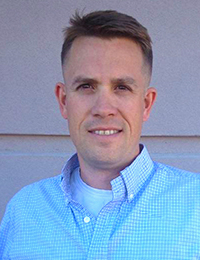A Different Perspective: Bringing Business Logistics to Military Work
 Doug Hendriks
Doug Hendriks
Lane Chief, Program Integrator for Special Programs, J8 at Joint Improvised Threat Defeat Agency, U.S. Department of Defense
Doug Hendriks has learned a lot in his more than a decade of service in the U.S. military. But when Major Hendriks wanted to enhance his knowledge about supply chain and logistics, he turned to the civilian sector and the University of Washington.
Doug enrolled in the Master of Supply Chain Transportation & Logistics program and found exactly what he was looking for.
“By pursuing a master’s degree at the UW, I gained a perspective that's different from what is taught in the military,” he said. “The program gave me new insight and applicable skills to solve logistical problem sets in performance, risk and operational management. The civilian business practices really gave me an edge.”
He graduated with his master’s in 2016. Here Doug talks about how the skills and connections he gained from the program have already made him a better supply chain professional, and have helped him in his career.
Can you explain what you do in your current role?
I’m with the J8 staff within the Joint Improvised-Threat Defeat Organization (JIDO). We focus on the rapid acquisition of new technology that we think can benefit the war fighter. We look at how civilian technologies can be adapted for the military, and we work with companies as well as with universities and government R&D agencies to help develop or acquire those technologies.
Why did you choose to go back to school for your master’s degree?
Once you get to the field-grade level, the military is assessing individuals for their capacity to pursue education and self-improvement. This program gave me the opportunity to stretch my horizons and study information from a different perspective than within the standard logistical practices of the Army — to learn better practices and methods of executing business within the Army logistics community.
Have you been able to use what you learned in your job?
Definitely. In many instances throughout the program I was involved in situations at work that I could relate to the coursework, or apply the coursework to problem solving in my job. Even today, we were doing some cost analysis and looking at the performance of an investment in new technology that we made recently. I reverted back to the performance management course in estimating the long-term monetary value of the project, which helped my senior leaders make a more informed decision.
How were you able to fit your studies in with a busy schedule?
It’s very difficult in the military to take the time to pursue a master’s. Either you take two years off to go study at a university full time — which is usually only awarded to people in very focused career fields — or you study online. This program provided me the flexibility to go back to school while still maintaining full-time service.
Did you find the program welcoming to military professionals?
Yes. I understand that universities are sometimes a little apprehensive about having military personnel within their study programs. But within the supply chain community, I noticed there was an immense interest in cross-collaboration of information. Does the military have a process or a methodology that we're missing in the business sector? Does the civilian business sector have a process or methodology that we would want to identify, and share those ideas? It was very inviting.
Did you make helpful connections during your time in the program?
In the military, building relationships has a huge impact on your success. I developed good relationships with the instructors, who are very top-tier professionals from top organizations.
During my coursework, the program also had a general officer on the advisory board. His advice and mentorship was extremely beneficial, and has helped position and prepare me for more challenging jobs within the Army.
How do you think earning your master’s will help your career in the long term?
I remember from day one, the instructors said the goal was to empower and equip us to be change agents within our organizations — to take what you've learned back to your profession and use it to make your organization better. That’s been the most beneficial aspect I’ve experienced.